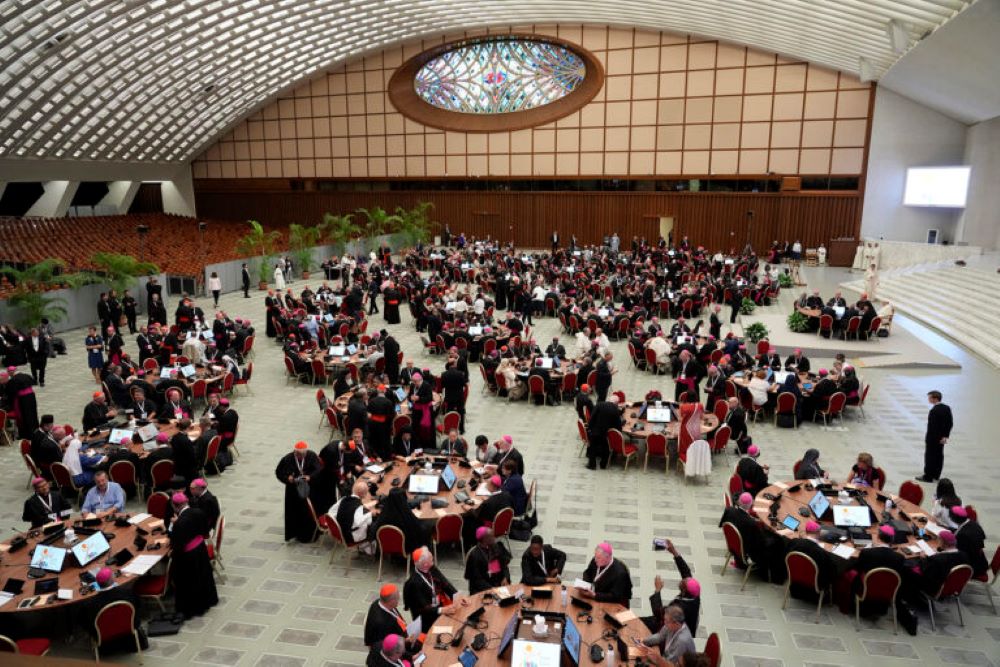
Pope Francis, sitting at far right table, participates in the opening session of the 16th General Assembly of the Synod of Bishops in the Paul VI Hall at the Vatican Oct. 4, 2023. The 2024 assembly is set for Oct. 2-27. (RNS/AP/Gregorio Borgia)
The synod on synodality, which will hold its second and presumably last session in October, needs to set its own agenda, even if that means rejecting the pope's agenda.
The synod's first session was held last October after a worldwide consultation in parishes and dioceses around the world, where Catholics came together to talk about the future of the church. Their hopes and concerns were collected and discussed in a monthlong synodal meeting in Rome involving not only bishops, but priests, religious and laypeople, men and women. They followed a process that included prayer and open discussion with an emphasis on careful and respectful listening to each other.
Some of the topics discussed were controversial: women deacons, the church's ministry to LGBTQ+ Catholics, priestly formation, the selection of bishops and the role of the laity in the church. Since the synod could not reach consensus on these topics, its synthesis report called for further study.
My fear is that simply focusing on synodality will reduce the synod to a meeting on meetings. … Rather than discussing musicology, we need to be an orchestra playing a symphony with actual instruments.
Though the synod presumed these topics would come back to them at their next session with more information and analysis, the pope sent the more controversial issues to committees to report back to him in 2025 after the synod has concluded. The committees will only give interim reports to the synod in October.
Why did he do this?
For the pope, the synod was never about these hot-button topics. The heart of the synod for him was the synodal process itself: listening and discerning the direction of the Spirit. He now wants this next session of the synod to focus on how to make the church more synodal in parishes, dioceses, episcopal conferences and internationally.
The instrumentum laboris, or agenda of the synod, drawn up by the synod office in the Vatican, reflects the pope's wishes.
I totally support the pope's goal: to make the church more consultative, more synodal. This reflects his disdain for clericalism and his desire to increase the role of the laity in the mission and governance of the church. He wants the bishops and priests to understand that they are servants of the people of God, and he wants the laity to understand their role in evangelization.
Those who participated in the October 2023 synod were almost universal in praising the process. They liked the prayerful atmosphere and the way everyone was listened to with respect. The delegates felt free to express themselves. The lay members felt their contributions were treated equally in the discussions.
If synodality could become part of the DNA of the church, it would be a wonderful result.
The problem, however, is that the synod meetings are held behind closed doors, and the synodal delegates are forbidden to talk about what goes on. This is supposed to ensure that the delegates feel free to talk, but it also makes it more difficult for the delegates to share their experience with the rest of the church.
My fear is that simply focusing on synodality will reduce the synod to a meeting on meetings. Talking only about synodality can lead to a level of theological abstraction that goes nowhere. The most effective way to learn synodality is to do it on concrete issues facing the church.
Rather than discussing musicology, we need to be an orchestra playing a symphony with actual instruments.
Some delegates are disappointed with the pope's decision to export the controversial items to the study groups. Women delegates are especially upset by the removal of women deacons from the agenda.
As Sr. Elizabeth Davis, a synod delegate and a member of the Congregation of the Sisters of Mercy of Newfoundland and Labrador, Canada, noted, the instrumentum laboris "says over and over again, the role of women in the church has to change (but) the diaconate for women will not be addressed at the second session. It needs to be addressed."
Davis also notes that the document insists that all final decisions will be made by the hierarchy. It "keeps reminding us that despite our baptism, we do not have equality in our church because God created me as a woman."
She is also distressed at "the failure to be much more overt about the inclusion of members of the LGBTQ+ communities."
It's unclear whether other delegates will be upset enough to demand a revision of the agenda. The fathers of the Second Vatican Council threw out the documents drawn up by the Vatican Curia and set their own agenda. Could history repeat itself?
Advertisement






